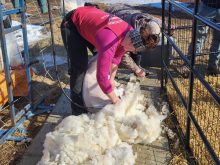Cattle producers who are still using fenthion-based products to control parasites in their commercial herds could find themselves on the wrong side of the law this year.
Fenthion, once widely used as a pour-on insecticide for controlling lice, warbles and other biting insects, was deregistered Dec. 31 by the Canadian Pest Management Regulatory Agency.
As a result, the use of fenthion-based products such as Tiguvon Technical Insecticide, Spotton Cattle Insecticide, Lysoff Pour-On for Lice and Tiguvon Pour-On Cattle Insecticide has been prohibited since Jan 1.
The maker of the products, Bayer Inc., agreed more than two years ago to voluntarily withdraw all fenthion-based insecticides after the PMRA initiated a re-evaluation of the organophosphate chemical to determine its safety and impact on the environment.
Read Also

Charges laid after cattle theft
Saskatchewan RCMP lay two charges against a man after six cattle went missing.
The last date of sale for registered fenthion products in Canada was Dec. 31, 2004. Existing supplies were to be used by the end of 2006 and disposal of remaining products after the expiry date must be carried out at the product owner’s expense.
Fenthion use has been prohibited in the United States since November 2004.
Fenthion has stirred considerable controversy among conservationists and environmental groups in Canada and the U.S. for the past few decades.
In the U.S., the American Bird Conservancy lobbied extensively to have the product deregistered, citing extreme toxicity to birds.
Together with two other U.S. environmental groups, the ABC filed a lawsuit against the Environmental Protection Agency in 2002, citing violations of the Endangered Species Act and the Migratory Bird Treaty Act in the continued use of the chemical.
At the time, fenthion products were being used to kill adult mosquitoes in four Florida counties and had been implicated in the deaths of hundreds of birds, including an endangered Piping Plover.
In Canada, wildlife experts have recorded a handful of incidents involving fenthion poisoning in birds.
Most recently, a farmer in west-central Saskatchewan reported the deaths of several magpies near a cattle-feeding area in the spring of 2006. The Canadian Co-operative Wildlife Health Centre in Saskatoon conducted autopsies on the birds and found traces of the poison.
Gary Wobeser, a wildlife pathologist at the centre, said cases of fenthion poisoning are rare in Canada.
Fewer than half a dozen incidents have been recorded in the past 15 years and most have involved magpies – efficient scavengers that often feed in close proximity to cattle feeding areas.
Poisoning usually occurs when birds consume fenthion residues in food and water. It is also highly toxic to birds when absorbed through the skin or inhaled.
Wobeser recalled only one case of secondary fenthion poisoning, where a bird of prey died after feeding on the carcass of another poisoned bird.
Roy Lewis, a cattle veterinarian based in Westlock, Alta., said Lysoff, Tiguvon and Spotton were once commonly used products among commercial cattle producers.
However, use has declined steadily with the development of safer, less expensive and more effective alternatives.
Remaining on-farm supplies of fenthion are likely small, he added.
“With the manufacture of these products done (two years ago), basically everyone has just used up their supplies,” Lewis said.
“There might be a little bit kicking around here and there … but I would assume most farmers would have used it up by now and have just moved on to … one of the other products that are available.”

















